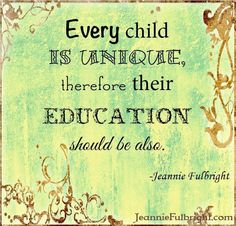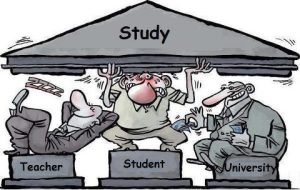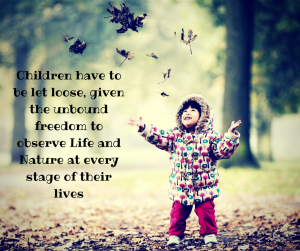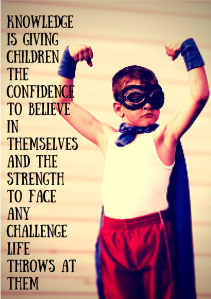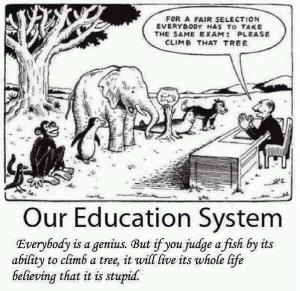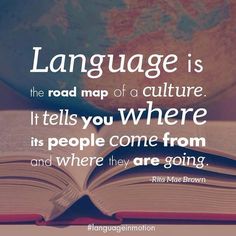What was once Education is now termed Wisdom. Rather than being an experience enriching an individual’s intellect and making sure they’d ease into the society, Education today has become a means to an end. The Ends being getting into XYZ University, Getting an ABC Degree, so that you can be a PQR at an MNC. Has the system corroded or has the one most powerful weapon of civilization taken the necessary evolution to keep humanity on track for the years to come? Read on to find out.
In so far as the rest of the article is to continue, it is my own take on how education might have come into being and institutionalized specifically in my own capacities as a writer.
While many regard Ramayana, Mahabharata, Quran, Bible, Guru Granth Sahib and several other religious texts to be the docets of their religions, I believe they were mere reflections of people trying to bring out an ideal world, an ideal man, and all possessed a core set of beliefs which would appeal to the masses to make them believe truly that this path was a nice one to take. Irrespective of beliefs, faiths, Religion and Religious works are and will continue to be a human’s first experience with the process of Education. They educate you about their own versions of Good and Bad, God and Devil, and so on.
Moving further on, Education has gone through a lot of changes from time to time, adapting itself to the needs of the day. Education at one point of time meant creating fire out of rubbing flints, and in another age meant bending wood into circular shapes and making wheels, and at another meant learning the arts of their trade, war tactics and the like. It has gone from being elitist to being a beacon of hope for the poor to get to the same level playing field of the rich, to being the only distinction between being cultured and non-cultured, and becoming the process any human around the world would look at as the critical requisite and way for better things to come.
During the ages of colonization and world wars, many viewed education as a foreign evil, and denounced it in retaliation. Well, that is history now isn’t it? The very fabric on which many modern countries are built on today are based on the same newer more liberal thoughts brought about because of the varied forms of education at the foray. Education has indeed changed the course of human history more than we credit it for. It’s indeed gone places from sketched on the wall to having its oldest manuscripts protected within the comforts of the four walls of a museum. It has indeed ushered us to greater heights and given us a common platform, setting up all the minds around the world to brainstorm and put their collective efforts to keep humanity on track; But hey! It has also given us destruction, annihilation, deep rooted racism, and much more.
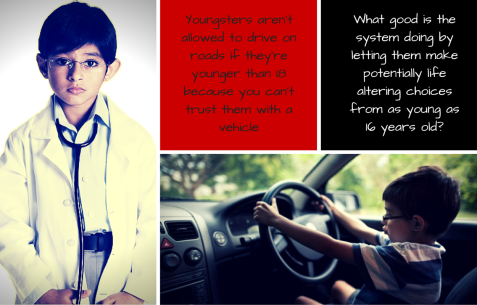
What do we do when we go heads up against a problem with the very same system that is supposed to solve all problems? Education today is nothing more than the prep up for a rat race that is ridiculed with problems of elitism and institutionalisation. India, today has more people going to school than it ever did in it’s past, but is it educating its masses the right way? Or is there a blink and miss somewhere? When youngsters aren’t allowed to drive on roads if they’re younger than 18 because you can’t trust them with a vehicle, What good is the system doing by letting them make potentially life altering choices from as young as 16 years old?
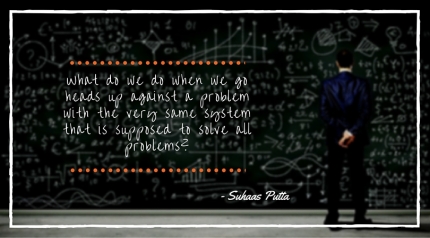
Education needs to be hands on, leave alone rote learn everything! I do indeed understand the need for having a strong base in all the possible subjects we are mandated to learn till our high schooling, but it is the profiling done soon after that leaves me both spellbound and awestruck. The amount of stress put on children is abnormally high and leaves a very strong imprint on them. Not pointing fingers here! If this system gave us the smartest minds yet, think of all the possibilities it’ll hold when we better and perfect this system! It’s just about time we stop treating education as a cash cow and keep milking it by offering ridiculously high cost education which is worthless and start changing the way we educate and make it approachable for everyone, rich and poor alike.
I do realize these topics have been brought forward many, many times over, but then the reason for them popping back up so often signals at how the problem was never tackled efficiently. Schools these days try so hard to sell the idea of holistic development, but trust me when I say this, no kid will ever grow holistically if you keep burdening him with the orthodox ways of teaching. Fortunately or unfortunately this generation’s attention span is the same as the memory capacity of a goldfish, a minute. We can’t reverse their evolution, but we can definitely change our methods to better cater to the needs of today. Before we teach them the complex intricacies of Differentiation and Integration, lets teach them why they pay the taxes that they do over the food they eat, the clothes they buy, and how do they know their money is well spent.
Years from now, we’ll see a revolution anyway. People like me are merely the starting drizzles creating ripples on the surface of education. Well, what do they say? When it rains, it pours! Change will come our way, it’s only about how prepared are we to tackle it. We need our youth smarter now than before. We’ve seen the world go at loggerheads with itself and start a world war, let’s hope we educate our youth well enough to make sure humanity is never threatened by itself again. Should there comes a day when Education leads to the downfall of humanity, it’ll be another brick in the wall, and Pink Floyd will be humming away, ‘We Don’t Need No Education…’
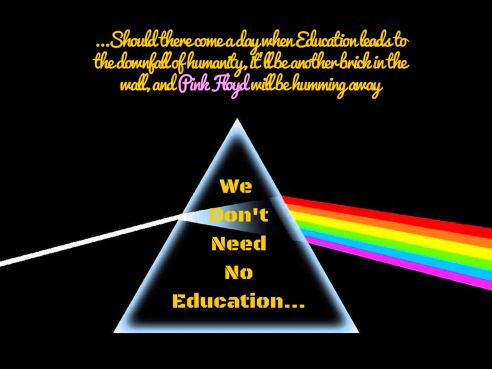
– Suhaas Putta –
(Check out his blog – All About Loud Silence)
